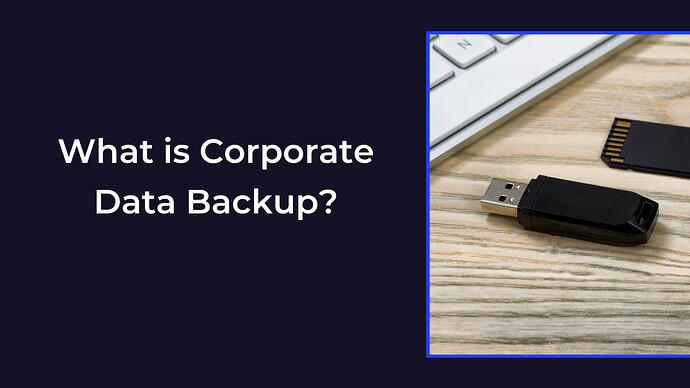In the business world, data is super important. Whether it’s customer info, money records, product details, or employee files, data helps with smart decisions, improving things, and giving value to customers.
But here’s the thing: data can be at risk. Computer crashes, hard drive problems, or even natural disasters can mess it up. And if data gets lost, it’s like taking a big hit in time, money, and reputation. That’s why having a way to back up data in businesses is crucial.
Think of corporate data backup as a safety net. It combines hardware and software to ensure a business keeps going, even when disaster strikes, by stopping data loss and keeping everything running smoothly.
We will learn about why corporate data backup matters, the different ways to store data, and all the good things it does for businesses.
What Are Corporate Data Backup Solutions?
Corporate data backup solutions cover a suite of software and hardware devices collaboratively working to create backups of a company’s data. In this context, a backup refers to a replicated copy of data stored separately from the primary data source. This separation ensures that if an unforeseen event impacts the primary data source, the data can be restored from the backup.
Several types of corporate data backup solutions exist, catering to the size, complexity, and needs of different businesses:
-
Removable Media: This basic yet cost-effective solution involves using devices like USB drives, CDs, DVDs, or tapes for data storage. However, it has limitations such as constrained storage capacity, low durability, and susceptibility to damage or loss, and requires manual intervention.
-
External Hard Drives: A more sophisticated option includes using a hard disk drive connected to a computer through cables or wireless means. Offering greater storage capacity than removable media allows for automated regular backups. However, challenges include higher costs, dependency on power supply, vulnerability to physical damage or theft, and potential compatibility issues.
-
Cloud Backup: Emerging as a modern and popular choice, cloud backup entails utilising online service providers that store data on their servers via the Internet. It boasts unlimited storage capacity, high security, scalability, automation, and ease of use. However, challenges include internet speed and reliability dependence, higher long-term costs, and potential privacy and compliance concerns.
How Does Corporate Data Backup Work?
The corporate data backup process varies based on the chosen solution. Nevertheless, the general steps involve the following:
-
Selecting the Data: Deciding what data to back up and how often, considering options like full data backups or specific files and folders, and establishing a backup frequency.
-
Choosing the Storage: Selecting the type of storage device or service aligned with budget, capacity, and security requirements, with options ranging from removable media to external hard drives or cloud backup services.
-
Performing the Backup: Executing the backup operation using compatible software and hardware tools, manually or through scheduled automatic backups.
-
Verifying the Backup: Confirming the success of the backup, ensuring the integrity and accessibility of the data using tools like checksums or encryption.
-
Restoring the Data: Retrieving data from the backup device or service in the event of a disaster or data loss, with tools like recovery software or restore wizards facilitating the process.
What Are the Benefits of Corporate Data Backup?
Embracing corporate data backup gives you numerous advantages on businesses:
-
Business Continuity: Ensuring uninterrupted business operations in the face of unexpected events, enabling swift resumption of activities and minimising the impact on customers and stakeholders.
-
Data Protection: Safeguarding data from accidental deletion, corruption, modification, or theft, complying with legal and regulatory data retention and security requirements.
-
Cost Savings: Avoiding data recovery or reconstruction expenses and reducing the risk of revenue or customer loss due to data-related issues.
-
Competitive Advantage: Gaining an edge over competitors by showcasing reliability, professionalism, and trustworthiness to customers and partners.
Conclusion
Corporate data backup stands as an indispensable component of any robust business strategy. It safeguards data, ensures business continuity, and provides a competitive advantage. However, selecting an appropriate backup solution is paramount, necessitating alignment with specific business needs and goals.

